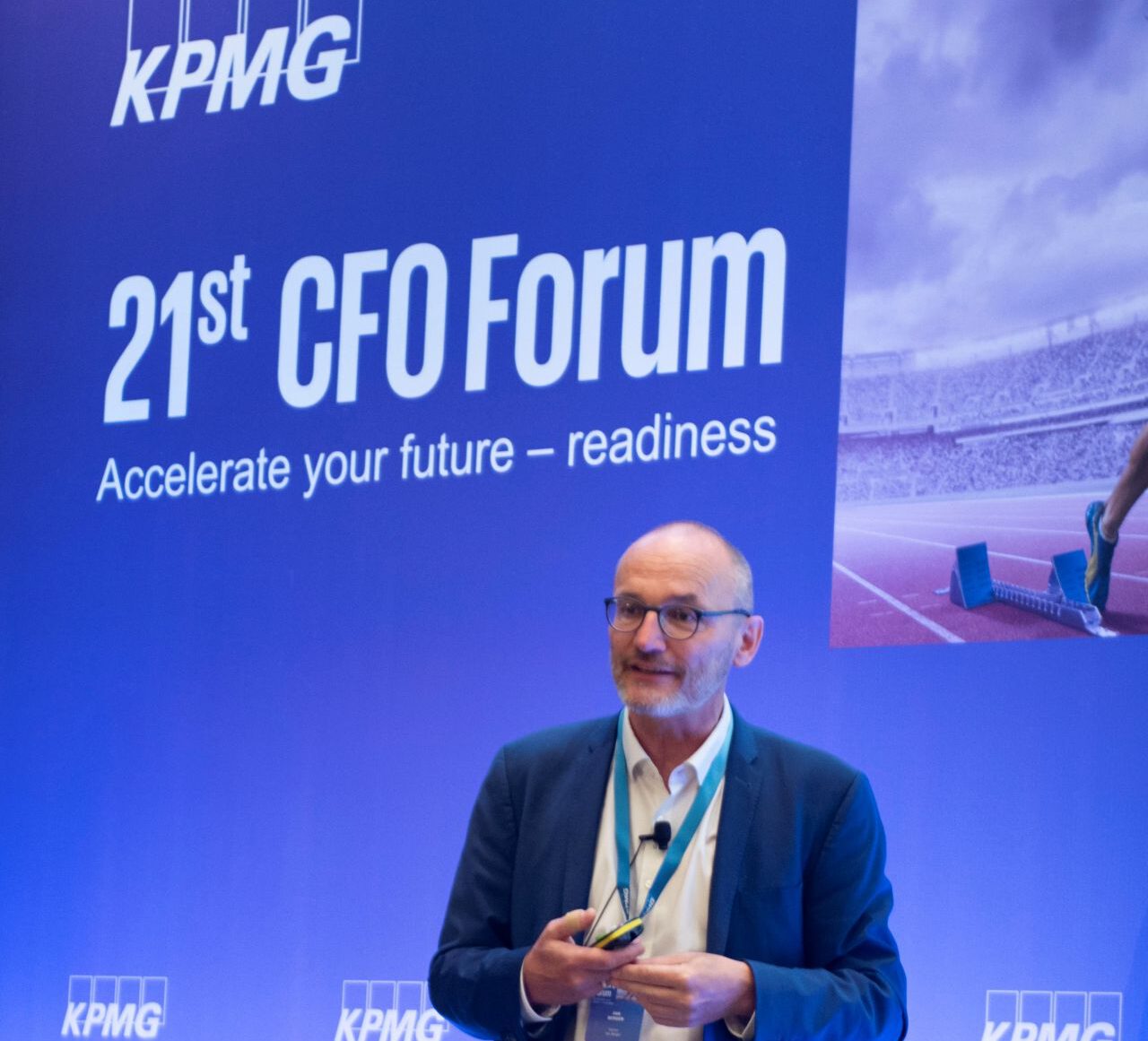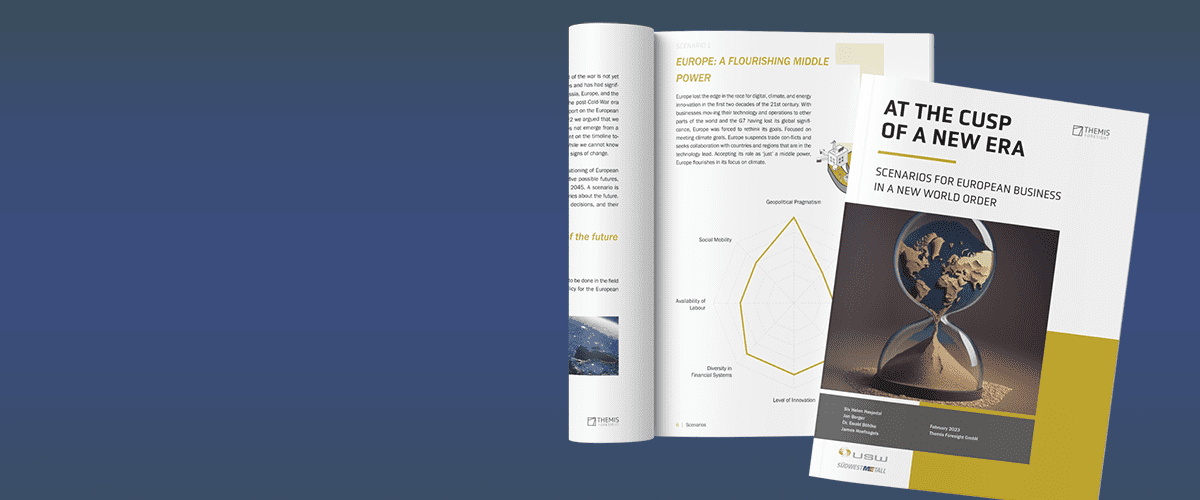Interview: European businesses will face many challenges in the coming years
Jan Berger speaking at the CFO Forum of KPMG in Greece.
I am happy to reproduce in English an interview that I gave to Greek BusinessNews.gr last week. The original can be found here. Thank you Dimitris Tsoukalas for the interview!
Interview between BusinessNews.gr and Jan Berger – Themis Foresight
Shortly before his participation in KPMG’s 21st CFO Forum in Greece, the founder and CEO of the think tank Themis Foresight spoke to BusinessNews.gr about the future of the European economy and the challenges and opportunities it may bring.
What will be the scope of your keynote at the 21st CFO Forum in Greece? What will you try to get across to the attendees?
I will discuss how the global shifts in economic weight and interests, technological innovation, and financial infrastructure may impact on the European economy. I will also look at changes within the EU itself and sketch out five scenarios for the European economy that my company, Themis Foresight, has developed over the last year. I’m looking forward to the discussion!
What are the main changes that you see taking place regarding the European economy in the following years?
The economies of the EU face several challenges in the coming years. Broadly speaking (and of course there are exceptions), in the last three decades, EU corporations have relied on cheap energy from Russia, cheap commodities from China, cheap security from the U.S., cheap credits from central banks, and the export of high-tech to developing countries in the “global South”. All these premises are gone. It used to be that large manufacturers were in a situation where they could make entire nations dependent on their technologies – not only through the actual products, but through service contracts, consulting, etc. This business model of technology dependence is gone because there are plenty of alternatives on the market. Developing nations are aware of this and leverage these changed conditions in their favor.
Furthermore, the fate of the EU is not decided. Under the impact of the Ukraine war the political center of the EU has shifted from Western Europe further to the East. France and Germany are not aligned. Strong anti-EU tendencies have led to BREXIT, and similar exits may be possible. There’s also a fierce competition of different policy outlooks among European leaders. Some favor more centralization in Brussels, others view the EU as a utilitarian bloc. Irredentism, while currently somewhat of a marginal political force, is still very much alive in a number of Eastern EU countries. Currently, the EU seems incapable of formulating a joint strategy that would satisfy all of its member states.
What are the sources and the reasons for these changes and which sectors are going to be affected the most?
European technology, especially, but not only, in the digital space, are increasingly non-competitive with China and the U.S. And we’re only looking at the beginning of this development. The Australian ASPI institute recently published a report in which they compared scientific publications around critical future technologies and came to the conclusion that China is in the lead in 37 out of 44. Formerly developing nations like China or India are making their economic weight felt in the world. G7 GDP (PPP) was surpassed by that of the BRICS states. This gives them leverage in global politics. The African continent will be a major source of economic growth and technological development in the coming decades. This has different implications on different sectors of the economy. Automotive and its suppliers may be hit very hard lest it proves capable of not only mastering the scale-up of electric mobility, but to also develop new mobility concepts. European manufacturing is still very advanced. Yet, other countries are closing the gap or have already surpassed European manufacturers when it comes to new materials.
We also witness a strong regionalization of economic zones. The picture that we’re headed into a global confrontation between China and the U.S. is one-sided and only one scenario. We may also see the development of up to a dozen trade regions that will negotiate new conditions and new rules of trade. This will impact heavily on the logistics sector with new routes, new types of logistics. For instance, Europe remains energy-hungry but has foreclosed energy imports from Russia. Last, but not least, energy-intensive industries like chemicals or steel are at a severe competitive disadvantage due to the high energy prices in Europe.
In February Themis Foresight published the document “At the Cusp of A New Era” presenting five scenarios for European business in a new world order. Could you present them to us in brief? Which of the five do you think most likely to happen?
The scenarios are deliberately set for the year 2045. And the purpose of the scenarios was not to determine the likelihood of any one scenario to win out, but rather to enable businesses and politics to jointly discuss the merits of each scenario for their own purpose. Four scenarios are politically driven. A fifth scenario is counterfactual and hypothetical if business had its own way without having to worry too much about political interference. Our scenario “History Ends, Again” discusses the impact for the European economy if the “global West” maintained its leadership in the world, still dominated heavily by the U.S. Our scenario “The Great Exit” looked into the question of what would happen if the EU were to fall apart. In some countries of the EU, we observe strong tendencies of focusing on the internal market only, spiced with concepts of degrowth economics. We called it “Global Village Europe”. And the fourth political scenario “A Flourishing Middle-Power” anticipates a Europe that navigates the global tensions to its own advantage and makes itself less dependent on American security policy. Glimpses of such a scenario could be observed during French president Emmanuel Macron’s recent visit to China.
Are there challenges that European business will have to face in the future that are included in any given scenario?
Yes, every scenario discusses trade-offs. But the challenges are different and not only limited to business. A significant premise for any continued Western leadership in the world is not only an acceleration of innovation cycles in industries, but the ability to rally the majority of the population behind the idea of Western democracy which has started to erode in reaction to Reaganomics in the U.S., Thatcherism in the U.K., and austerity measures in the wake of the world financial crisis of 2008. Will there be sufficient financial resources and inventiveness and social flexibility to achieve this?
The scenarios that anticipate less European involvement in an American-led security doctrine need to anticipate a significant increase in spending on defense. This money is currently allocated in education, social welfare or economic subsidies like agriculture. Either way, it’s not going to be easy to negotiate new priorities.
What would you advice CFOs and business leaders in Greece? Where must they focus in order to cope with the new world landscape and the shifts in the European economy?
With shipping, transportation, and tourism being three strong pillars of the Greek economy, CFO’s should closely watch the development of international financial mechanisms. The dominance of the U.S. Dollar is being challenged everywhere in the world – not only in deals that Sino-Saudi oil trade can be handled in Yuan or the trade between Brazil and China in Yuan. The Shanghai Cooperation Organization, ASEAN, BRICS, etc. have encouraged initiatives for trade in local currencies. The Mercosur states discuss the introduction of a joint currency similar to the Euro in Europe. This calls for a diversification of currency portfolios. It may also mean for the banking sector an increase of the cost of capital on top of inflationary tendencies, and thus debt financing through banks may become more difficult. Other financial products may be called for that weigh less on the balance sheets of banks and corporations.
More broadly speaking, we have observed a shift of innovation away from only digital technologies towards technologies that have a positive impact on the environment – be it around climate issues with renewable energies, renewable or climate-neutral materials, circular economies, but also in agriculture with a focus of innovation going in the direction of reversing damages to biodiversity that we have inflicted on nature in the last two centuries. Innovating in this space and being able to scale such new forms of production will be a core component of the economies of the future. As refined petroleum products will gradually be replaced by alternatives such as hydrogen or carbon-neutral ammonia and other fuels, this will have implications not only on end-production but also delivery routes and techniques. Greek business may be well-positioned to innovate in these areas.
Can your strategy stand the stress test?
We apply our scenarios to business models and strategies of our clients. Which developments do you need to anticipate? Which risks could emerge? And what new chances are there?




